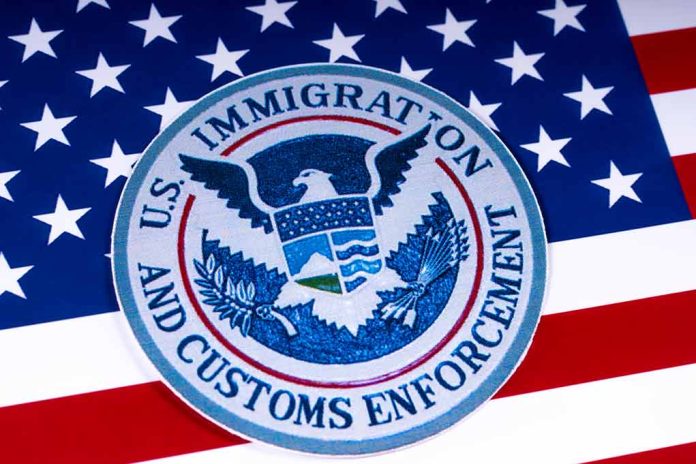
A Boston judge dismissed charges against an undocumented immigrant after ICE agents arrested him during trial, sparking a contentious legal battle between state courts and federal immigration authorities.
Key Takeaways
- Boston Municipal Court Judge Mark Summerville dismissed the case of William Martell-Lebron after ICE agents arrested him during his trial for providing false information on a license application.
- The judge held ICE agent Brian Sullivan in contempt of court, describing the situation as “obstruction of justice” and a violation of the defendant’s rights.
- Assistant District Attorney Jack Lucy admitted to knowing about ICE’s plan to detain Martell-Lebron, despite the District Attorney’s Office claiming no prior knowledge.
- The incident highlights the tense relationship between local courts and federal immigration enforcement, particularly in sanctuary cities like Boston.
- Judge Summerville ordered ICE to return Martell-Lebron to court to stand trial, but ICE ignored the court order.
ICE Arrests Defendant Mid-Trial
ICE agents arrested William Martell-Lebron, a Dominican national, during his active trial in a Boston courtroom. The arrest occurred after the City of Boston refused to cooperate with federal immigration authorities. Martell-Lebron was on trial for allegedly providing false information on a driver’s license application when ICE agents detained him outside the courthouse during a break in proceedings, effectively preventing him from returning to his own trial.
Defense attorney Murat Erkan accused the state of planning to deport Martell-Lebron, suggesting coordination between prosecutors and federal authorities. The timing of the arrest – during an active trial – raised immediate concerns about interference with judicial proceedings. Massachusetts State Police stated their troopers followed protocol by neither assisting nor obstructing the federal action, highlighting the delicate position of state law enforcement in such situations.
ICE agents arrest illegal alien mid-trial outside Boston courthouse.
A Boston Municipal Court Judge Mark Summerville accused ICE Agent Brian Sullivan of violating the rights of illegal alien William Martell-LeBron and held Sullivan in contempt of court after the ICE agent… pic.twitter.com/BMJ38jg6bt
— Patriot Lady (@angelwoman501) April 1, 2025
Judge’s Response and Contempt Ruling
Boston Municipal Court Judge Mark Summerville responded forcefully to the ICE arrest, dismissing the case against Martell-Lebron and finding ICE agent Brian Sullivan in contempt of court. “This is a disturbing case. This is a case of obstruction of justice. It’s a case of violating a defendant’s right to be present at trial and confront witnesses against him. Couldn’t be more serious,” declared Summerville. Sullivan did not attend the subsequent court hearing where the contempt charge was issued. The judge ordered ICE to return Martell-Lebron to court to stand trial, but federal authorities ignored this directive, escalating tensions between state and federal jurisdictions.
Judge Summerville characterized the situation as a serious obstruction of justice and a violation of the defendant’s constitutional rights to be present at his own trial and confront witnesses. He also criticized the Suffolk County District Attorney’s office and ordered an investigation into Agent Sullivan’s actions, indicating his belief that the arrest represented a breach of proper judicial process.
Conflicting Accounts from Prosecutors
The case has revealed contradictory statements from the Suffolk County District Attorney’s Office. Assistant District Attorney Jack Lucy admitted to knowing about ICE’s plan to detain Martell-Lebron. However, another assistant district attorney, Cailin Campbell, claimed prosecutors had no knowledge that the defendant would be arrested. This inconsistency has fueled questions about potential coordination between local prosecutors and federal immigration authorities.
Suffolk County District Attorney’s Office spokesperson James Borghesani expressed surprise and dismay at ICE’s actions, stating, “We agree with the judge that it’s an egregious move by ICE to do this. We intended to try this defendant at trial.” Suffolk District Attorney Kevin Hayden was expected to address the issue in a news conference, as the incident has sparked widespread criticism of ICE’s methods and raised concerns about the impact on judicial processes.
Broader Implications for Immigration Enforcement
The Boston courtroom incident highlights ongoing tensions between federal immigration enforcement and local judicial systems, particularly in cities that limit cooperation with ICE. The case raises fundamental questions about defendants’ rights within the judicial system, regardless of immigration status. It also exposes procedural conflicts when federal immigration priorities clash with state court proceedings.
Civil rights advocates have pointed to this case as an example of how immigration enforcement can potentially undermine constitutional protections and due process. Meanwhile, supporters of stricter immigration enforcement argue that ICE was fulfilling its mandate to apprehend individuals in the country illegally. The outcome of this case may influence future ICE operations in courthouses and shape the ongoing national debate about immigration enforcement practices.







